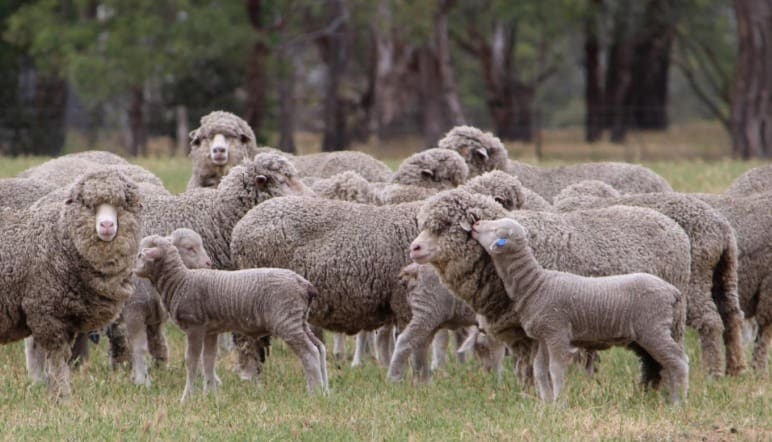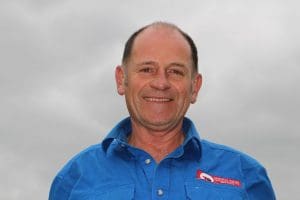
Merino ewes and lambs after liquid nitrogen application.
AUSTRALIAN sheep producers are lining up for a new breech modification process developed as an alternative to surgical mulesing.
The new cryogenic breech modification process developed by Victorian veterinarian John Steinfort is now called ‘steining’ and uses liquid nitrogen to reduce skin wrinkle.
“It modifies the breech to make shearing and crutching easier and by doing that it will decrease the incidence of flystrike on the animal, although we haven’t done any trials on flystrike.
“We are doing it so that animals can be handled, have less dag and are easier to crutch and shear,” he said.
The latest developments in the commercialisation of the process will be outlined at the Balmoral Sire Evaluation Group’s field day on 22 February at the Bunge family’s ‘Kooringal’ property near Coleraine, west of Hamilton in Victoria.
The field day will showcase sheep from the 2017 and 2018 drops of the Australian Merino Sire Evaluation progeny in trials located at ‘Kooringal’. The 2017 and 2018 drop progeny, including progeny from 50-year old semen frozen in 1968, will be displayed in their sire groups along with associated wool and carcase trial results. An update of the Balmoral 2015 and 2016 drop Merino Lifetime Productivity Project results will be also available.
Dr Steinfort will among the guest speakers at the field day, which will also include the chair of Australian Wool Innovation Colette Garnsey and MLP Project manager Anne Ramsay.
25,000 sheep and lamb booked up for ‘steining’

Dr John Steinfort
Dr Steinfort said about 23,000 lambs underwent the process last Spring in the Hamilton area on six properties in pre-commercial trials.
“There is a huge amount of interest and everyone is really applauding an alternative being offered.
“We’ve got some weaners booked in for this Autumn — people have stopped mulesing and we didn’t have time to do them as lambs last year so we are doing them as weaners,” he said.
“We have probably got about 25,000 sheep and lambs booked up for this year – the demand outstrips the supply, absolutely.
“The best thing that has happened in out pre-commercialisation trials is that after a few weeks we never had any system breakdowns and we were getting up to 900-1000 lambs done a day and we believe we can finetune it to improve that,” Dr Steinfort said.
“Because of the software driving the patented system now it is really consistent, repeatable and systematic.”
Liquid nitrogen working across variable skin types
He said the system is working across variable Merino skin types without any need for pain relief. Although there is some “not excessive” pain involved, lambs run off and mother up easily afterward.
“What we have seen is that we haven’t had a skin type that it can’t handle and we’ve gone from really highly wrinkled to tight wrinkles to loose skin.
“The beauty of the system is that once you apply the nitrogen to the skin the whole area goes numb,” Dr Steinfort said.
“Farmers involved in the pre-commercialisation trials said there is no need for pain relief.
“But for farmers who would like to use pain relief as part of their management and quality assurance systems, we are going to do some trials to show scientific evidence of the results with the University of Melbourne and the Mackinnon Project this year.”
Dr Steinfort said the Mokanger trial data comparing liquid nitrogen to mulesing with pain relief and lamb marking only reflected well on the impact of the process on sheep, compared to that of surgical mulesing with pain relief. The process’ minimal impact on sheep is becoming more evident as increasing numbers of lambs are ‘steined’, he said.
Kooringal sire evaluation and commercial flock lambs that underwent the steining process at lamb marking in 2018 and in 2017 will be on display at the MLP field day, plus research results and videos. Dr Steinfort said there will be a gradual roll-out of the process to match demand.
“AWEX has said that it is not mulesing – that it is classified as a non-mulesing or ceased mulesing breech modification process.”
Sheep that have undergone the process have had their wool classified as non-mulesed, according to the National Wool Declaration rules, he said.
The Kooringal field day and sheep display will run from 11am-5pm on 22 February with guest speakers from 2pm. The property address is 2115 Coleraine-Edenhope Road, Coleraine.
Commercial displays and working demonstrations from sheep industry businesses with the latest industry innovations will also run throughout the day.
For further information download the flier on www.facebook.com/balmoralbreeders

HAVE YOUR SAY